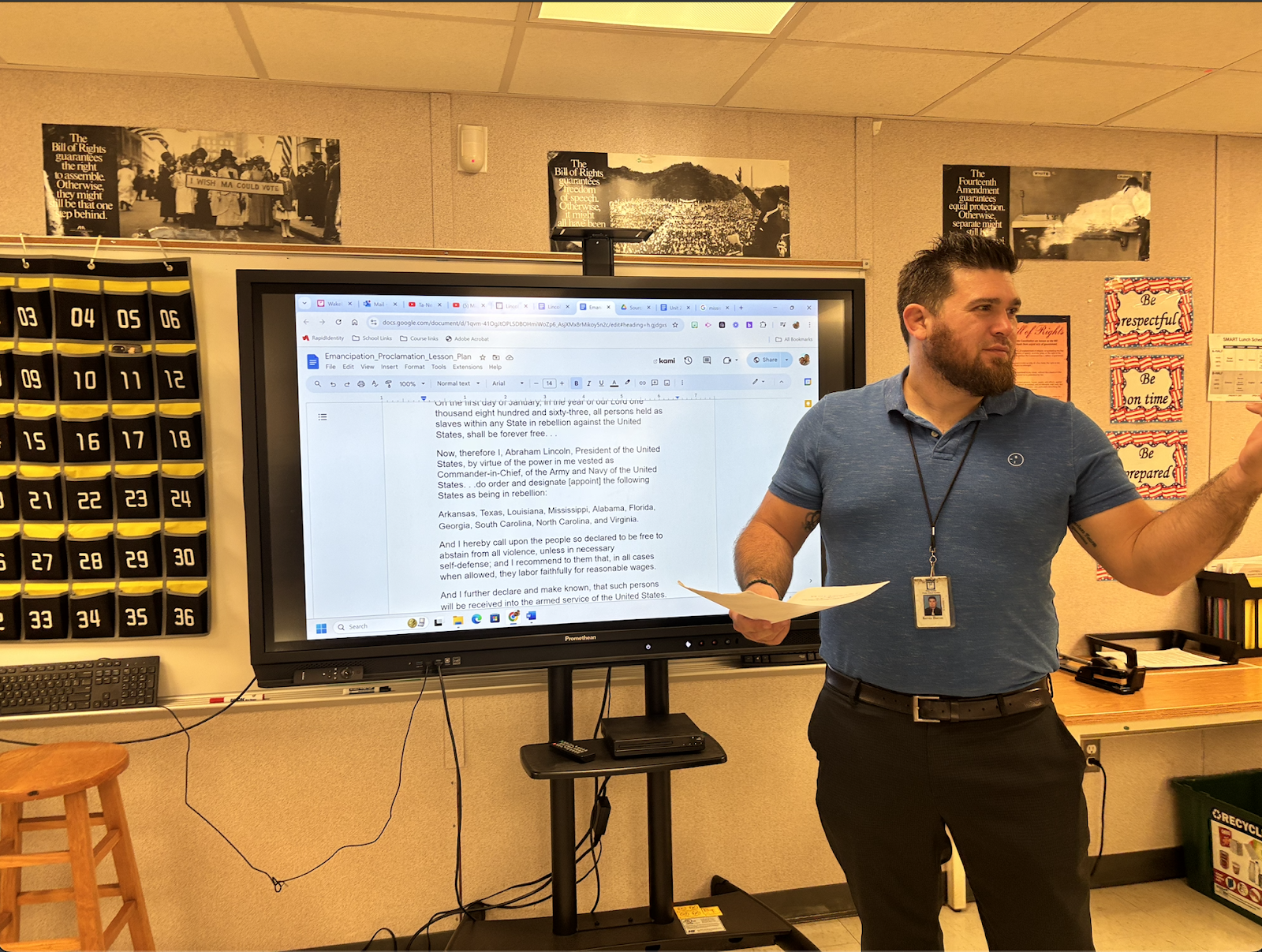“People are always going to try to suppress the truth, suppress the truth of what really happened, because they don’t want to seem like they did something wrong. They don’t want to seem like the victors, so they want to play the victim,” said Sienna Drumgo, an African American sophomore at Green Hope. She is one of the few students taking the first-ever AP African American Studies course.
Banned in one state and restricted in 17 others, Advanced Placement African American Studies was introduced to Green Hope students in the 2024-25 school year. However, this offering occurred amid years of backlash from state governments across the country.
In 2022, the course was adopted by 60 schools nationwide as part of the Pilot 1 program to start integrating AP African American studies into school curriculum. In 2023, this initiative expanded to nearly 700 schools, representing over 40 states and available to approximately 13,000 students in the second stage of its rollout.
During the second year of the initiative, the Florida Department of Education issued a letter in January 2023 to College Board, the nonprofit organization that runs the Advanced Placement program, regarding its decision to ban AP African American Studies from high schools within the state. This decision sparked a nationwide controversy over the course’s credibility, particularly when many critics and scholars pointed out College Board’s silence in defending the integrity of the course material.
On Feb. 11, 2023, almost a month later, College Board released a statement saying, “We deeply regret not immediately denouncing the Florida Department of Education’s slander, magnified by the DeSantis administration’s subsequent comments, that African American Studies ‘lacks educational value.’ Our failure to raise our voice betrayed Black scholars everywhere and those who have long toiled to build this remarkable field.”
They further said, “We had no negotiations about the content of this course with Florida or any other state, nor did we receive any requests, suggestions, or feedback.” Emphasizing that the course was not politically shaped in any way and that scholars and students everywhere were harmed because of Florida’s letter deriding the field of African American Studies by describing topics as “historically fictional.” The College Board was stern in their judgment of Florida’s Department of Education, condemning “this uninformed caricature of African American Studies.”
However, like Florida, the Arkansas Department of Education issued a statement on August 14, 2023, warning schools about the course and suggesting that it violated state law. Previous legislation passed in March prohibited the teaching of critical race theory, saying it would “indoctrinate students with ideologies.”
The Arkansas Department of Education also declined to answer questions about its demur to the class. Its statement on Monday emphasized that the course “is not a history course.”
College Board said it is “committed to providing an unflinching encounter with the facts of African American history and culture, and rejects the notion that the AP African American Studies course is indoctrination in any form.”
They further emphasized that more than 200 colleges and universities had already signed on to provide credit for AP African American Studies, including the University of Arkansas and Fayetteville. Additionally, College Board provided insight into how the first pilot year brought many stories from classrooms about how this course changed lives, providing a richer understanding of the foundations of this country.
Arkansas, North Dakota, Mississippi, Texas, and Virginia, are among the 18 states that have passed “anti-CRT” laws. These laws enforce restrictions on lectures about racism and race that make students feel “guilty” for the past actions of their race. On the other side, states like New Jersey and Illinois were more concerned about keeping African American Studies course content uncensored, emphasizing the class’s authenticity. If College Board censored content, the states would not accept credit for it.
Drumgo offered her personal insight on these states limiting AP African American Studies, saying, “People are afraid of what might come from that, they’re afraid of the opinions that might rise up and teaching their children we were wrong here. I’m not surprised that happened. It is very saddening that you’re going to have a generation of kids that just don’t know this stuff, but it is the sad truth, unfortunately.”
After months of discussion, debate, and discourse about the AP African American Studies course content, College Board released a revised and final version of the curriculum on December 6th, 2023, during the Pilot II year.
“It defines the course content, what students will see on the AP Exam, and represents more than three years of rigorous development work by nearly 300 African American Studies scholars, high school AP teachers, and experts within the AP Program,” said a statement issued from College Board.
College Board further stated that they consulted with professors from 200 colleges, including historically Black colleges and universities, and high school teachers to revise this framework. The course focuses on essential experiences, events, and individuals that scholars deem crucial to studying African American history and culture.
Newly introduced this school year, AP African American Studies is available in all US schools.
Mr. Kevin Bacon, a teacher at Leesville High School for a decade, became one of Green Hope’s newest additions to the staff this school year. He was offered the opportunity to teach this course—which he gladly accepted. “They [Green Hope] were really interested in this African American History course and asked me specifically about it, already having two classes worth of people who were signing up for it.”
After attending the University of North Carolina at Chapel Hill, Bacon began his teaching career at Wendell Middle School for three and a half years. He then transitioned into teaching AP United States History and African American History Honors as an elective at Leesville High School for a decade before joining the Green Hope community.
On the first day of class, Bacon told his students about the political discussions behind this course. He explained that the AP African American Studies class shouldn’t be a political topic but more about the history behind a specific group of people and their struggles.
“We are talking about the struggle of a certain group and their perseverance. […] Specifically, when we get to America, it’s difficult for people to go back and trace their lineage and know exactly where they came from because it was stolen from them.”
Drumgo joined this class to learn more about her identity.
“I don’t really know much about my family. I obviously know what I’ve been told by some of my relatives, but just knowing that there are so many things that African Americans have accomplished that have kind of gone under the radar for years, it’s kind of sad to know.”
More than just another AP class, this history class stands out. Since the class is focused on only one group throughout history, it allows students to look at periods and pinpoint where African Americans were during this event and what was happening– uncovering more uncomfortable topics.
“A lot of our history classes, sugar-coated things, and it was always just the basics. And a lot of times, it victimized the white man in the situation. […] We grew up getting taught that these people were heroes and that what these people did was great, but in reality, it’s not.” Drumgo states.
Bringing these topics into the classroom might have been difficult for some, but Mr. Bacon was keen on educating himself and not whitewashing any part of crucial Black history.
“I spent two summers reading nothing but race and economic books […] so that we could deep dive on a lot of the harder topics, like the system of mass incarceration, Redlining, etc. They’re the topics that, when I get done with this course, hit kids the most, and they’re like, ‘Are you kidding me?’”
Discussing such subjects is easier when like-minded Green Hope students choose to take the class. Every student has a reason for picking AP African American Studies, whether it is delving into more AP classes, educating themselves on Black history, or simply being curious about a new course. “I’m hearing a lot more answers that have a lot of thought to put into that, and I feel like I have room to speak up more and to actually give my actual answers and beliefs and not just have to tone it down,” Drumgo said, talking about the students in Green Hope’s first AP African American Studies class in history.
Bacon strives to provide an environment where students not only read and take notes but also explain and talk about things that happened in African American history, allowing students to discuss these sentiments. There is a lot of room to ask questions and be curious about new topics students have never heard of before.
“In any class that I do, there’s going to be discussion, debate, discourse… These are things that are personally affecting people to this day, and because the topics are so heavy, we are going to have that trust that you guys [students] can talk to one another.”
Students who take AP African American Studies can apply this course to their future. Like any history course, many high schoolers ask themselves: “When will I use this?” The curriculum of the class is designed to bring up themes and cultures that are relevant to present-day lives. When students analyze human behavior and patterns, educators can look and say, “How is this situation similar to the one we’ve seen before” or “What did we as humans do that was positive, that worked, and then what was negative?”
In AP African American studies specifically, prejudice is one of the things that students should be looking out for and applying it to other marginalized groups. Looking at racial biases, students will use the knowledge from this course and the lessons about Black history. This can apply to a better understanding of marginalized groups and to educating future generations about where certain stereotypes came from and who institutionalized them.
Drumgo says this class gives a broader understanding of what American history classes are typically like, “AP African American Studies is a very educational class, and you’re going to learn about a lot more than just the basics covered in history class. It gives you perspective on what we’ve missed out in history and why it’s important to know the history so that we can keep it from happening in the future.”
By exploring issues like systematic racism and injustices, as well as celebrating growth and perseverance, Green Hope students are developing a deeper understanding of African American history: confronting tough truths essential for a well-rounded education and understanding the true complexities of American society today.




















